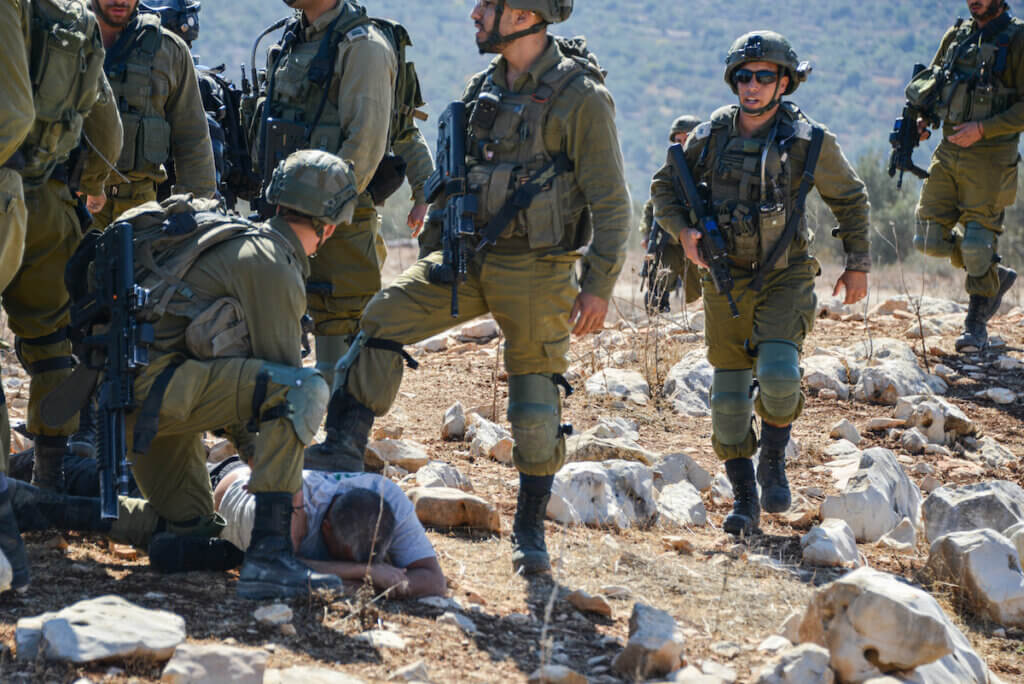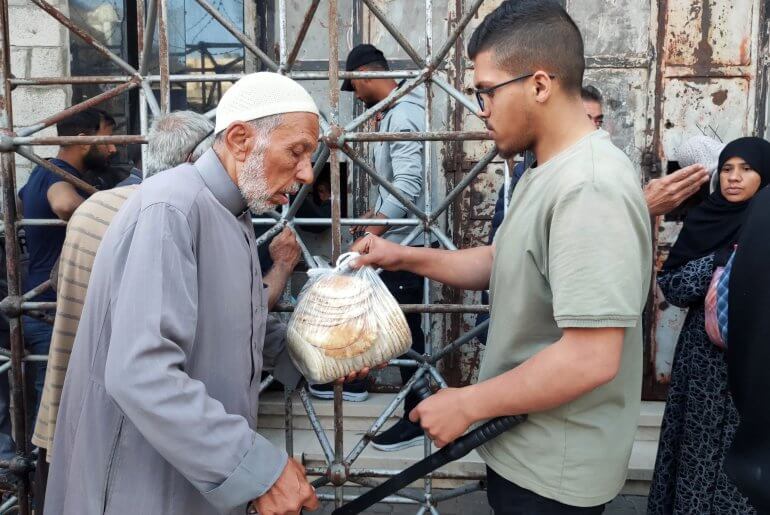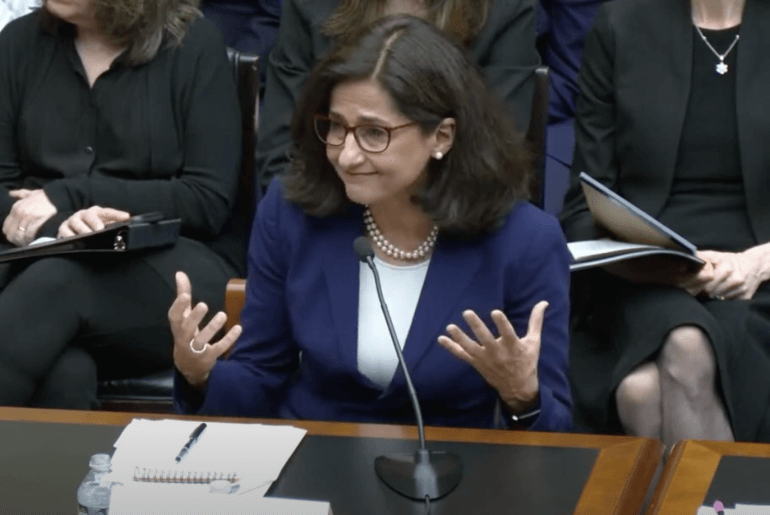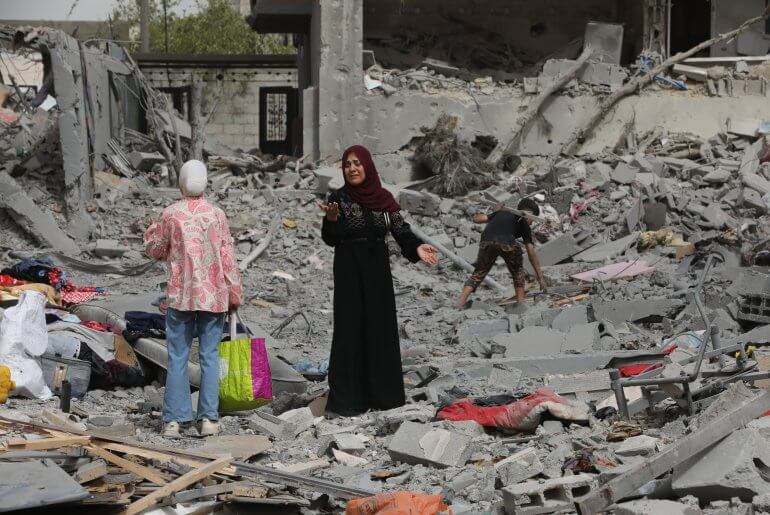A photo of an armed Israeli soldier, surrounded by dozens of his fellow soldiers, standing on the back of a Palestinian man as he lie face down in the ground went viral on Palestinian social media this week.
The photo was taken in the midst of a brutal Israeli crackdown on activists as they attempted to escort a group of Palestinian farmers to their land in order to harvest their olive trees in the al-Ras area west of Salfit, in the northern occupied West Bank.
Activists and local farmers who were at the scene told Mondoweiss that the man in the photo, Palestinian activist Mohammed al-Khatib, was violently beaten, kicked, and punched in the face by Israeli soldiers before he was thrown on the ground and dragged across the rugged terrain before he was stepped on, and eventually blindfolded and taken into custody.
“The soldiers attacked us all in an extremely aggressive manner,” Munther Amira, a Palestinian activist with the Popular Resistance Committee in the West Bank, who was at the scene on Monday, told Mondoweiss.
“We tried to reason with them and tell them we were just trying to help the farmers reach their land so they could pick the olives, but they refused,” Amira said.
According to Amira, al-Khatib was one of several activists who attempted to move past the soldiers and arrive at the olive groves nearby. When he did that, the soldiers attacked.
“They started attacking people everywhere, throwing tear gas, and beating anyone who tried to move closer to the olive groves,” he recounted, noting that two Israeli activists were also detained in the process, and a Palestinian journalist was also beaten.
According to testimony from Matan Golan, the photographer who took the photo of al-Khatib lying on the ground, there was no tear gas fired at the crowd, but rather sound bombs. Golan also mentioned that there were several signs in the area indicating that the are was a “closed military zone.”
“The photos speak for themselves, and tell you everything you need to know,” Amira said, adding that when he and other activists tried to step in and help al-Khatib, they were also beaten and pushed around.
By Wednesday afternoon, al-Khatib and the other activists had been released, but the farmers from Salfit had still not been able to access their land.
“This is all part of the intimidation tactics of the occupation, to prevent the farmers from going back to the area and harvesting their olives,” Amira said. “But we will not abandon the farmers, because this is Palestinian land, and belongs to us.”
“The olive harvest season is a blessed time for Palestinians. But for the settlers and soldiers it is a time of destruction, blood and violence.”
Settlers in, Palestinians out
For generations the people of Salfit have enjoyed al-Ras, a mountainous area on the western outskirts of the city, for its rolling olive groves, and views of the Mediterranean coastline just beyond the wall.
Dr. Dheeb Shtayyeh, a university professor and farmer from Salfit, told Mondoweiss that he and his family have been using the land at al-Ras for generations.
“I used to come here with my father as a boy and pick olives with him,” Shtayyeh said. “And when I got older, I started to bring my children here to play, and would come with my family here for picnics year round.”
Shtayyeh’s family is one of a dozen Palestinian families who own land on al-Ras, but have been unable to access their land since December 2020, when an Israeli settler showed up and established an illegal outpost on the mountaintop.
“All of a sudden, whenever we would try to go to al-Ras, soldiers would show up and kick us out,” he said. “The moment the settler would see us, he would call the soldiers, and they would be there within minutes, telling us it was a closed military zone, and we were not allowed to be there.”

Over the past year, Shtayyeh, along with dozens of other families from Salfit and activists around the West Bank have been staging weekly demonstrations and peaceful actions in protest of the establishment of the outpost on their land.
He says they are nearly always met with tear gas and violence on part of the Israeli military, which maintains a now permanent presence in the area to protect the outpost.
In July, Israeli forces violently suppressed one of the protests with tear gas, causing some of the olive trees to catch fire.
“That is when we really started to worry about the trees, especially because the harvest is coming up,” he said.
Once the olive harvest began in October, as it does every year, Shtayyeh and his fellow farmers’ fears were confirmed when they attempted to reach their groves in order to pick their olives, but were swiftly turned around by the soldiers, who said they “needed permission” to be in that area and to harvest the olives.
“We have the papers that are more than 200 years old, proving that this land belongs to us and belonged to our grandfathers,” Shtayyeh remarked. “So why would we need permission from the occupation to pick our olives?”
Following the brutal attack on the activists and farmers on Monday, Shtayyeh said that the families are fearful of what will become of this year’s harvest, which many of the families rely on financially for the coming year.
“This is the first time in generations that we have not been able to harvest our olives,” he said. “We wait all year for the harvest. We not only depend on it for our lives, but also for our culture, and to teach our children about our heritage.”
Despite his fears, Shtayyeh said that he doesn’t plan on giving up or abandoning his land.
“We will never give up this land, no matter the cost,” he said. “They prevent us from accessing our land, they attack us with all their weapons and power, they arrest us, and kill us, but we will not give up.”
“I used to bring my son here every year to pick olives with me, but now I bring him to the protests, so he can learn and understand that this is our land, and that we will never give it up.”
This article was updated to reflect testimony from Matan Golan, the photographer who captured the photo of Mohammed al-Khatib lying on the ground as a soldier stepped on his back.
October 14th, 9:24am EST




I wonder if yonah fredman and jon s get giddy when contemplating the unfettered heroism of these sabras.
Such valour.One prone unarmed Palestinian versus just a mere dozen heavily armed young Jewish boys.
Life is just so unfair for these poor hard done by , modern day Spartans.
But not to worry, they will be the recipients of “The Lehi Ribbon of Honour” or some other misnamed medal honouring Jewish Terrorists such as the Lehi Terror Gang.
Only in Israel –who claim to be part of the modern world , are terrorists revered and put on pedestals, Instead of Gallows.
Is it any wonder Israel is on it,s way to the bin of history.
God , let me live long enough to see that day.
Breaking news –
https://www.timesofisrael.com/smotrich-at-knesset-ben-gurion-should-have-finished-the-job-thrown-out-arabs/
“Speaking from the Knesset plenum on Wednesday, far-right Religious Zionism MK Bezalel Smotrich said David Ben-Gurion, Israel’s first prime minister, should have “finished the job” and kicked all Arabs out of the country when it was founded.”
This brutal treatment is just a part of the creeping ethnic cleansing of Palestinians fro#m swathes of Judea and Samaria, or what the civilised world calls “Palestine”.
“To commit genocide it is not necessary to build camps and ovens. All that is required is to remove the basis for a way of life.” — Grand Chief John Kelly, testimony before the Royal Commission on the Northern Environment, 1977.